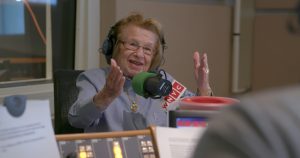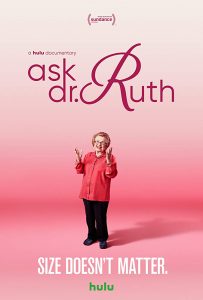“Ask Dr. Ruth” (2019). Cast: Interviews: Dr. Ruth Westheimer, Miriam Westheimer, Joel Westheimer, Jonathan Capehart, Betty Elam. Archive Footage: Johnny Carson, Arsenio Hall, David Letterman, Joan Rivers, Diane Sawyer, Phil Donahue, Regis Philbin, Bo Jackson, Fred Westheimer, Helen Singer Kaplan. Director: Ryan White. Web site. Trailer.
Were it not for sex, none of us would be here. Yet it’s amazing how, until comparatively recently, many of us have been reluctant or embarrassed to openly discuss something so fundamental to our nature and very being. No matter what the reason behind this, the hesitant among us long avoided the subject, almost pretending as if it somehow didn’t exist. But, given the magnitude of what’s involved in sexuality – on so many different fronts – it’s often been to our detriment to evade talking about it. This is why it has been so valuable to have someone come along who has been willing and courageous enough to help lead us out of the erotic darkness, to bring sex above board and out into the open for plainspoken but informed conversation, as seen in the new biographical documentary, “Ask Dr. Ruth.”
The national discussion about sex took a dramatic leap forward in 1980 with the premiere of Sexually Speaking on New York’s WYNY-FM radio. The public affairs broadcast, which was launched primarily to fulfill the station’s FCC licensing requirements, aired Sundays at midnight, a time slot typically allocated to low-ratings programming like this. But, much to everyone’s surprise, the show became a big hit, thanks primarily to its delightfully charismatic host, sex therapist Dr. Ruth Westheimer.
The charming, diminutive Dr. Ruth had never hosted a radio show before. However, her positive demeanor, practical, no-nonsense advice, and delightful German accent captivated listening audiences. Before long, she was hosting WYNY’s most popular program. And, over the next several years, she became a national media sensation, hosting syndicated radio and TV shows and making appearances on late night talk shows, game shows and other network programs, as well as in made-for-TV movies and commercials. She almost single-handedly made it possible to speak openly, publicly and frankly about sex in the media while simultaneously transforming herself into a cottage industry that proliferated and has persisted to this day.
[caption id="attachment_10726" align="aligncenter" width="200"] At 90 years young, sex therapist Dr. Ruth Westheimer keeps a full schedule as a writer, lecturer and media celebrity, as depicted in the new biographical documentary, “Ask Dr. Ruth.” Photo by Austin Hargrave, courtesy of Hulu Originals and Magnolia Pictures.[/caption]
At 90 years young, sex therapist Dr. Ruth Westheimer keeps a full schedule as a writer, lecturer and media celebrity, as depicted in the new biographical documentary, “Ask Dr. Ruth.” Photo by Austin Hargrave, courtesy of Hulu Originals and Magnolia Pictures.[/caption]
In “Ask Dr. Ruth,” director Ryan White lovingly profiles his munchkin-esque subject, revealing how this unlikely 90-year-old sexual guru rose to prominence and made such a significant mark on the nation’s outlook on a once-taboo subject. He shows how she became a notable figure in the sex therapy arena, as well as one of the most recognizable media personalities of the past 30+ years. But what’s perhaps most interesting is the filmmaker’s depiction of how she got there, a storied journey that took her through many trials, tribulations and escapades far removed from her roots.
Born Karola Ruth Siegel to Orthodox German Jewish parents in 1928, Westheimer grew up in Frankfurt. However, with the rise of the Third Reich and antisemitism over the next decade, her family’s future became increasingly uncertain. In hopes that she would be safe, Westheimer’s parents sent her to Switzerland in 1939 as part of the Kindertransport program, an effort aimed at protecting Jewish children by housing them in orphanages. But, when the young Karola left her homeland, it was the last time she would see her parents, who would eventually become victims of the Holocaust.
When World War II ended, Westheimer emigrated to British-controlled Palestine, where she joined the Haganah, a Jewish paramilitary organization, training as a scout and sniper. She says she never killed anyone but became a sharp shooter who never missed the target. The violence in the region nearly took a toll on her in 1948, when the explosion of a shell nearly cost her both of her feet.
After nursing herself back to health, Ruth relocated to France in 1950 with her first husband, a med school student. She studied and then taught psychology at the University of Paris, the beginning of a long and impressive educational path. The marriage didn’t last, however, her husband returning to Israel. But Westheimer was not alone for long, marrying her second husband when she became pregnant with her first child, Miriam. The couple emigrated to the US in 1956 for a new beginning, but this marriage did not last, either. Ruth soon found herself a single parent in New York, seeking to make ends meet while earning her master’s in sociology from The New School for Social Research.
[caption id="attachment_10727" align="aligncenter" width="300"] Never a stranger to a microphone, sex therapist Dr. Ruth Westheimer routinely doles out advice to captivated listeners, as seen in director Ryan White’s loving tribute to the guru of eroticism, “Ask Dr. Ruth.” Photo courtesy of Hulu Originals and Magnolia Pictures.[/caption]
Never a stranger to a microphone, sex therapist Dr. Ruth Westheimer routinely doles out advice to captivated listeners, as seen in director Ryan White’s loving tribute to the guru of eroticism, “Ask Dr. Ruth.” Photo courtesy of Hulu Originals and Magnolia Pictures.[/caption]
After two failed marriages, Ruth finally found the love of her life, Fred Westheimer, whom she married in 1961. The couple became parents of a second child, Joel, in 1964, moving to an apartment in the city’s Washington Heights neighborhood, where she still lives today. Ruth worked toward her doctorate in education, a degree she earned from Columbia University in 1970.
Ruth took a job at Planned Parenthood after graduation, a position that sparked her interest in human sexuality. It served as a springboard to post-doctoral study in the subject, working as a researcher with Helen Singer Kaplan at New York-Presbyterian Hospital. This background laid the foundation for what was to come when WYNY community affairs manager Betty Elam approached Westheimer and offered her the opportunity to host Sexually Speaking. And the rest, as they say, is history.
As Westheimer’s new career developed, she became more than just the host of a show about titillating dirty talk. She was a committed sexual educator who spoke candidly about subjects rarely if ever before broached in high-profile public settings. Her advice helped to dispel myths and offer comfort and guidance to those who lived lives outside the sexual mainstream, while giving individuals of all orientations useful and imaginative ideas on how to spice up their bedroom activities. In addition to her media appearances, Ruth became an accomplished and prolific author, producing a variety of books and articles, as well as a university lecturer. She also became a staunchly vocal advocate for research during the early days of the AIDS crisis, addressing the subject head-on and professionally at a time when others downplayed it, disparaged its victims and even made fun of the devastating illness.
Through it all, Ruth truly evolved as a sexual revolutionary, unlikely though it might seem. Given the tremendous success she’s attained, it’s apparent that Westheimer is quite proficient in the practice of conscious creation, the philosophy that maintains we manifest the reality we experience through the power of our thoughts, beliefs and intents. And, even if she’s never heard of this metaphysical doctrine, it’s obvious she’s well versed in its principles. Her expertise as a therapist, author, educator, and radio and TV host is a testament to this.
[caption id="attachment_10728" align="aligncenter" width="300"] At home in New York, sex therapist Dr. Ruth Westheimer enjoys life from the same Washington Heights apartment she’s lived in for decades, one of the venues shown in the new biographical documentary, “Ask Dr. Ruth.” Photo courtesy of Hulu Originals and Magnolia Pictures.[/caption]
At home in New York, sex therapist Dr. Ruth Westheimer enjoys life from the same Washington Heights apartment she’s lived in for decades, one of the venues shown in the new biographical documentary, “Ask Dr. Ruth.” Photo courtesy of Hulu Originals and Magnolia Pictures.[/caption]
Of course, critics would contend that, if she was so adept at creating such success, then why did she endure the hardships of her youth? That’s a legitimate question, but we can never really know why others manifest what they do, since their reasons are their own, and it’s not our place to question their motives. However, surely there are purposes behind such creations, even if they’re not readily apparent.
In many instances, seemingly questionable materializations often are related to learning particular life lessons. These ordeals can be difficult to go through, but their impact can be substantial, imprinting their significance deeply within our being, perhaps alerting us to the need for not repeating them and/or learning how to avoid them again in the future.
In other cases, certain experiences can help to groom us for what is to come later in our lives. For example, Ruth’s all-too-familiar awareness of what happened to Europe’s Jewish population during World War II helped prepare her for the rampant and hostile discrimination, bigotry and intolerance inflicted upon AIDS sufferers during the early days of the epidemic. Having lived through somewhat comparable circumstances, she became quite vocal in countering the arguments of those who called for the quarantining of the sick in camps not unlike those to which Jews and other minorities were corralled as part of Hitler’s “final solution.” Had she not had that experience in her youth, she may not have been able to relate to the indignities inflicted upon AIDS patients – or to speak to the troubling proposals that were raised – as authoritatively as she did as an adult. It also enabled her to become a champion for those seeking research into the causes of, and a cure for, this debilitating and heartbreaking illness.
Then there’s Ruth’s legendary diminutive stature. Standing at a mere 4’ 7”, under most circumstances, she ordinarily might not have been perceived as a force to be reckoned with. However, her slight physique helped make her a fighter, both literally and figuratively. For instance, her limited size made her an ideal candidate for becoming a Haganah recruit, one who could easily shrink into the surroundings, a quality well suited to a scout and sniper. And that experience, in turn, helped galvanize her as a frank, outspoken advocate for her causes and subject matter. It enabled her to push through barriers and command respect for her and her work. So this naturally raises the question, would she have been able to accomplish these tasks if she had grown into a “normal” stature?
[caption id="attachment_10729" align="aligncenter" width="300"] Back in Switzerland where she escaped the Nazi encroachment during World War II, Dr. Ruth Westheimer returns to the land that provided the young German Jew sanctuary – and saved her life – during the horrors of the Holocaust, as seen in “Ask Dr. Ruth.” Photo courtesy of Hulu Originals and Magnolia Pictures.[/caption]
Back in Switzerland where she escaped the Nazi encroachment during World War II, Dr. Ruth Westheimer returns to the land that provided the young German Jew sanctuary – and saved her life – during the horrors of the Holocaust, as seen in “Ask Dr. Ruth.” Photo courtesy of Hulu Originals and Magnolia Pictures.[/caption]
This feistiness also helped to make Ruth a fierce proponent for no-nonsense sex education and advice, something that didn’t always sit well with society’s more conservative elements during the early days of her career. She met with frequent criticism, and one opponent even went so far as to try and initiate a citizen’s arrest against her for allegedly violating public morality standards. Ruth would have none of that, though, stridently maintaining her values and infusing them with hefty doses of personal integrity and informed insights, qualities essential to her effectiveness.
All of which have made it possible for Ruth to live out her value fulfillment, the conscious creation concept associated with being our best, truest selves for the betterment of ourselves and those around us. I’ve written extensively about this subject of late, but that’s been possible thanks to the array of recent film releases (mostly biographies and documentaries) that have profiled individuals and organizations whose lives and actions have embodied this principle. Perhaps their proliferation and popularity are due to a perception that this is an attribute that’s in all too short supply these days, that it’s something desperately needed in our political, social, educational and commercial institutions. Such recent movies have thus provided viewers with excellent examples to emulate, and that’s very much the case here. Ruth’s willingness to take on such a once-controversial subject as human sexuality – and to do so with obviously great joy and enthusiasm – is indicative of value fulfillment in action. We should all be so courageous and spirited in our own quests.
Westheimer’s efforts have radically changed the sexual landscape, with implications that could be far more reaching than any of us is consciously aware. Would legalized same-sex marriage, for example, have come about were it not for the changes in attitude that Dr. Ruth helped to foster? Indeed, many of us may owe her far more than we know.
This endearing tribute lovingly portrays the life and adventures of a beloved expert and educator, charming – and moving – viewers at nearly every turn. It’s gratifying to see a film that honors the work of someone who has done so much good for so many. It paints a colorful portrait of a colorful character, one that’s a sure-fire crowd pleaser. “Ask Dr. Ruth” is currently playing in a limited theatrical run and will be available for streaming on Hulu beginning June 1.
If sex is indeed an essential part of our existence, wouldn’t it make sense for us to know as much about it as we can? As a truly creative force in its own right, sex is something through which we can exercise those imagination muscles we’re all equipped with, not only to make the experience more fulfilling and enjoyable, but also to inspire our overall inventiveness and ingenuity, attributes we can employ to enrich our larger existence and not just our erotic capabilities. Thankfully, we have someone like Dr. Ruth to help launch us into such explorations of deeper awareness, understanding and satisfaction on myriad fronts. And I don’t know about you, but that’s certainly good for me.
Cigarette anyone?
Copyright © 2019, by Brent Marchant. All rights reserved.
Sunday, May 26, 2019
‘Ask Dr. Ruth’ lovingly profiles a sexual revolutionary
Subscribe to:
Post Comments (Atom)

No comments:
Post a Comment